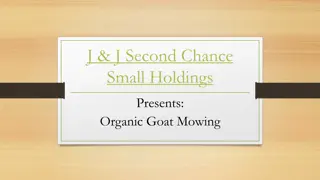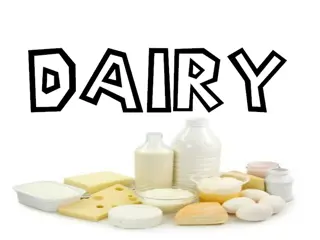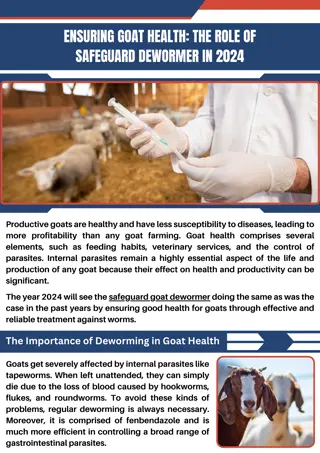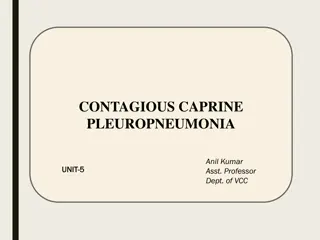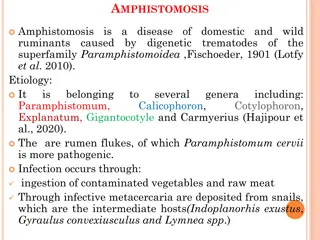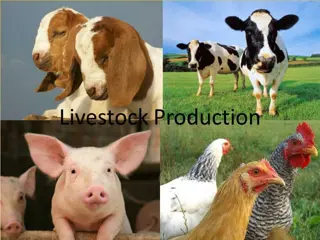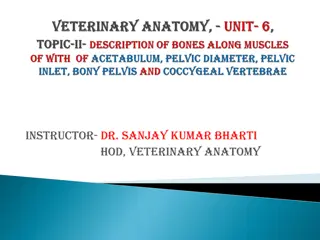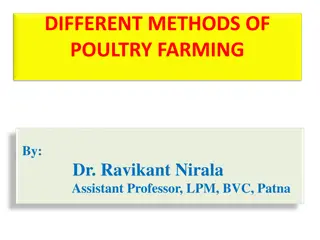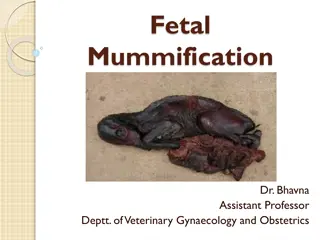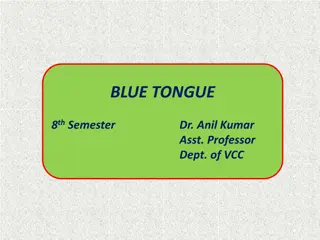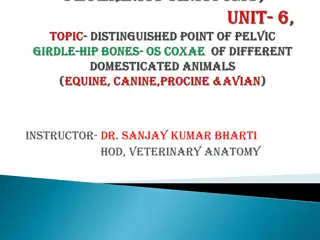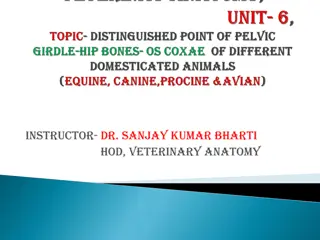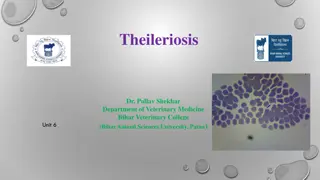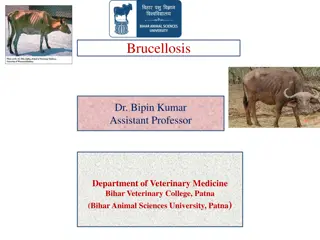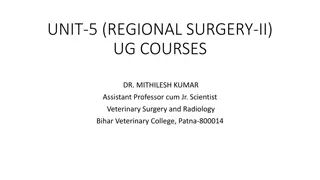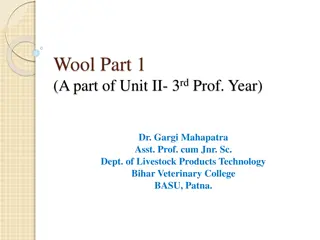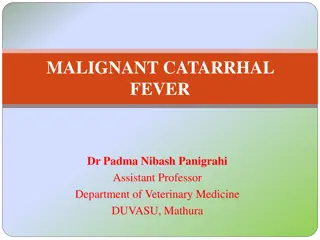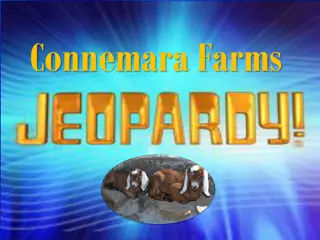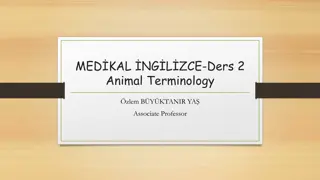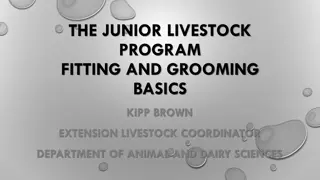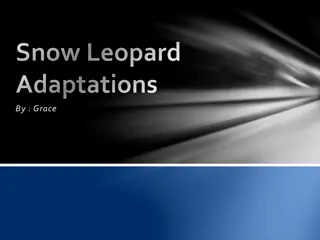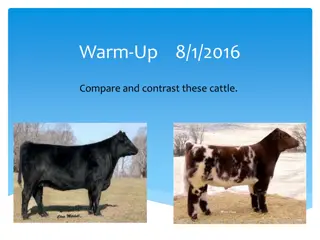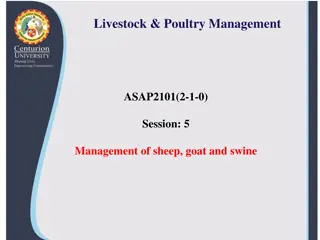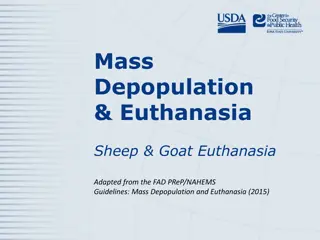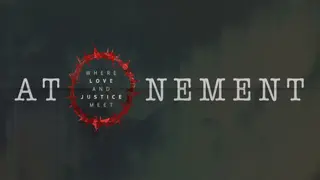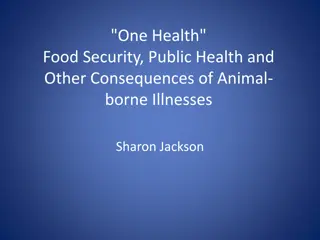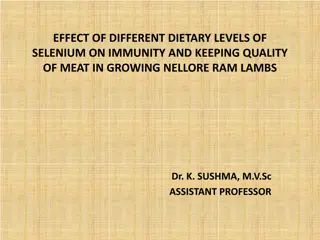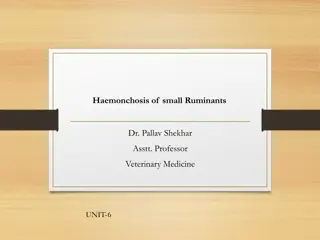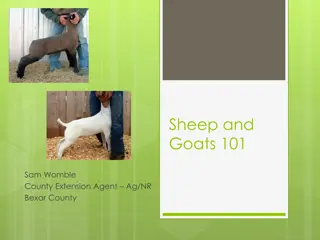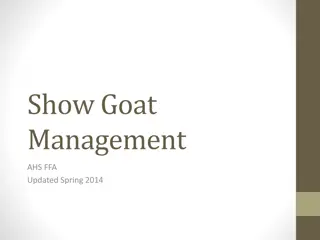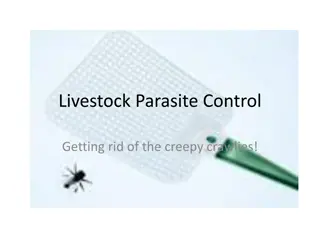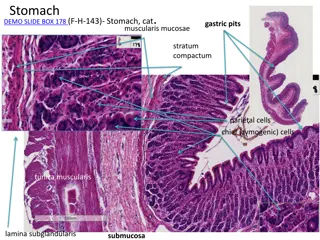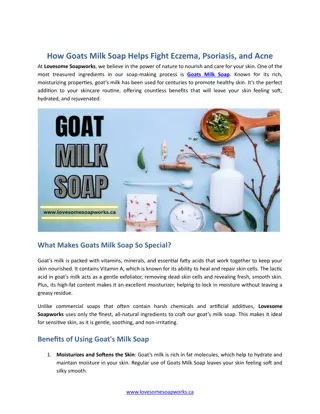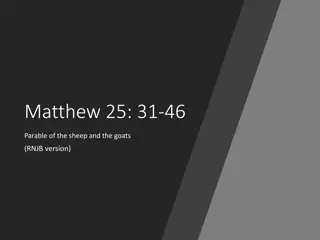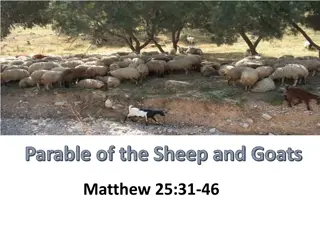The Benefits of Organic Goat Mowing for Your Lawn
Discover the advantages of using goats for lawn mowing, including cost savings, environmental benefits, weed control, and natural fertilization. Goats offer a sustainable and efficient way to maintain your property while reducing the need for pesticides and herbicides. Embrace a greener approach to
2 views • 14 slides
Insights into Milk Composition and Processing
Worldwide, milk is collected from various animals such as cows, goats, sheep, yaks, and water buffalo. The composition of milk includes water, lactose, butterfat, protein, and minerals, each playing a vital role in its nutritional value. The butterfat content determines the richness of dairy product
7 views • 41 slides
Control Internal Parasites In Animals
Parasite infections of goats can lead to improper digestion, reduced feed intake, weight loss, anemia and even death. Shop our safeguard goat dewormer to keep your goats healthy and parasite-free. Send us an email at sales@hubersanimalhealth.com for
0 views • 2 slides
Understanding Contagious Caprine Pleuropneumonia in Goats
Contagious Caprine Pleuropneumonia is a severe and frequently fatal respiratory disease affecting goats in India. Caused by Mycoplasma capricolum subsp. Capripneumoniae, it is not transmissible to cattle or sheep. The disease spreads through close contact and inhalation of respiratory droplets, with
0 views • 6 slides
Understanding Amphistomosis in Ruminants: Causes, Symptoms, and Diagnosis
Amphistomosis is a disease in ruminants caused by several types of rumen flukes. It leads to productivity losses, weight loss, fertility reduction, and other symptoms. Infection occurs through ingestion of contaminated vegetables and raw meat. The parasite affects the rumen and reticulum of sheep, g
0 views • 8 slides
Overview of Livestock Production: Cattle, Sheep, and Goat Breeds
Explore the diverse world of livestock production, including cattle ranching, dairy farming, hog and pig farming, poultry and egg production, and animal aquaculture. Delve into the specifics of sheep and goat production, from breeds and production systems to management practices, breeding techniques
1 views • 43 slides
Veterinary Anatomy Overview: Pelvic Cavity and Bony Pelvis Structures
The instructor, Dr. Sanjay Kumar Bharti, explains the acetabulum, obturator foramen, sexual differences, and characteristics of sheep and goats related to pelvic anatomy. Details include the structure of the acetabulum, the large obturator foramen, pelvic cavity, and differences between male and fem
2 views • 18 slides
Diverse Methods of Poultry Farming and Agricultural Practices
Poultry farming practices such as organic farming, nitrogen fixation, biodiversity management, and contract farming are discussed. Organic farming emphasizes holistic relationships in agriculture, promoting sustainable production. Nitrogen fixation and biodiversity management play essential roles in
0 views • 20 slides
Understanding Fetal Mummification in Domestic Animals
Failure in pregnancy stages can lead to fetal mummification, characterized by autolytic changes, mummification process, and dry, leathery tissue. Events required for mummification include fetal death post-bone development, rapid resorption of fluids, absence of oxygen and bacteria. This process is c
2 views • 27 slides
Understanding Bluetongue Disease in Sheep, Cattle, and Goats: Causes, Symptoms, and Diagnosis
Bluetongue disease is a viral illness predominantly affecting sheep, with occasional cases in cattle and goats. Transmitted by insect vectors, it can lead to various symptoms such as catarrhal stomatitis, lameness, and reproductive issues. The disease's impact, transmission methods, clinical signs,
0 views • 8 slides
Veterinary Anatomy: Pelvic Structures and Sexual Dimorphism in Animals
The article discusses the anatomy of the acetabulum, obturator foramen, pelvic cavity, pelvic inlet and outlet, and sexual differences in the pelvis, with a focus on sheep and goats. It covers the structure of these pelvic components and highlights the variations between male and female anatomies. D
0 views • 19 slides
Understanding Pelvic Anatomy in Veterinary Science
In this educational content, we delve into the intricate details of acetabulum, obturator foramen, pelvic cavity, pelvic inlet and outlet, sexual differences, and anatomical variations in sheep and goats. The explanations are accompanied by informative images to aid in better comprehension.
0 views • 19 slides
Understanding Bovine Theileriosis: Causes, Symptoms, and Prevention
Bovine theileriosis is a tick-borne haemoprotozoan disease that causes significant economic losses in livestock due to high mortality rates, weight loss, abortion, and reduced milk yield. The disease is characterized by fever, anemia, and respiratory and digestive disorders. It is caused by parasite
1 views • 11 slides
Understanding Salmonella: A Zoonotic Pathogen
Salmonella, a genus of bacteria, includes species causing various diseases in humans, cattle, sheep, goats, and poultry. The pathogen can be transmitted through contaminated food and is classified into typhoidal and nontyphoidal serovars. Nontyphoidal serovars are common and typically lead to self-l
0 views • 20 slides
Understanding Brucellosis: A Zoonotic Disease Impacting Animals and Humans
Brucellosis, caused by the genus Brucella, is a zoonotic disease affecting animals like goats, sheep, cattle, and humans. It is primarily transmitted through contact with infected animals or ingestion of their products. The disease manifests in various forms like Mediterranean fever and can lead to
0 views • 13 slides
Caecal Dilation and Torsion in Veterinary Surgery: Causes, Symptoms, Diagnosis, and Treatment
Caecal dilation and torsion is a condition observed in animals like cattle, buffalo, sheep, and goats, characterized by distension, displacement, and twisting of the caecum. This article discusses the etiology, clinical signs, diagnosis, and treatment options for this condition, highlighting the imp
1 views • 12 slides
Understanding the Physical Structure of Wool Fiber
Wool is a natural protein fiber with a unique structure composed of a cortex and cuticle, lacking a medulla. Its physical structure includes the cuticle as the outer protective layer, cortex with corticular cells, cell membrane complex, macro-fibrils, matrix, micro-fibrils, and helical coils. The st
1 views • 17 slides
Overview of Malignant Catarrhal Fever in Cattle and Other Species
Malignant catarrhal fever (MCF) is a fatal disease affecting various species, caused by two different viruses transmitted from wild animals. It is characterized by low morbidity but high mortality rates, with distinct clinical signs such as sudden death, head and eye manifestations, and intestinal i
0 views • 24 slides
Exploring Connemara Farms and Sandburg's Legacy
Dive into the world of Connemara Farms and the legacy of the Sandburg family. Visit the picturesque farm, learn about Carl Sandburg's writings, and uncover intriguing details about the family's life. From goats at Connemara to Carl Sandburg's literary works, this journey offers a unique blend of nat
0 views • 28 slides
Animal Terminology in Livestock Farming
Animal terminology in livestock farming includes terms like breed, dam, flock, herd, livestock, polled, sire, litter, chickens, cattle, ducks, and goats. Understanding these terms is essential for those involved in animal husbandry and farming. This comprehensive guide provides definitions and expla
1 views • 18 slides
Livestock Clipping and Grooming Basics for Show Exhibitors
Explore the essentials of livestock clipping and grooming for show animals, including tips on enhancing their appearance to meet show rules. Learn about the techniques, tools required, and best practices for different species like market steers, hogs, lambs, and goats, as well as breeding cattle and
0 views • 13 slides
Snow Leopard - Amazing Adaptations and Behavior
Discover the fascinating world of snow leopards, known for their yellowish and grayish coat that provides camouflage in their mountainous habitat. With a population ranging from 3,500 to 7,000 in the wild, these majestic creatures exhibit unique characteristics such as a two-feet-tall stature and th
0 views • 6 slides
Livestock Classes and Breeds: A Comparative Overview
Livestock consists of major classes such as Dairy, Beef, Sheep, Swine, and Goats, each serving specific purposes like milk, meat, wool, and more. Understanding the types of livestock within these classes, feeding requirements, and the distinction between purebred and crossbred animals is essential f
0 views • 9 slides
Comprehensive Guide to Goat Care and Management
Goat care and management cover a range of aspects including age, health, pregnancy, and environmental needs. Goats are versatile animals used for milk, meat, fiber, and more. Housing options such as confinement and extensive systems play a vital role in goat farming. Understanding these elements ens
2 views • 78 slides
Discovering Goat Care at Connemara Farms with Carl Sandburg
Explore the world of goat care at Connemara Farms through videos, stories, and poetry inspired by Carl Sandburg. Follow a ranger's responsibilities, experience a Five Senses Poem activity, and share your opinion on goat caregiving. Engage with the beauty and history of Carl Sandburg Home National Hi
0 views • 9 slides
Guidelines for Humane Sheep and Goat Euthanasia
Providing insights on mass depopulation and euthanasia techniques for sheep and goats during animal health emergencies. Focuses on humane handling, acceptable euthanasia methods, and considerations for minimizing stress and ensuring welfare. Emphasizes transitioning painlessly, safeguarding the food
0 views • 15 slides
Rituals of Atonement in Leviticus 16 Explained
In Leviticus 16, God instructs Moses regarding the rituals of atonement to be carried out by Aaron, highlighting the importance of purity and sacrifice. The chapter details the process involving sin offerings, the selection of goats, the role of Azazel, and the use of incense in the Holy Place. Thes
0 views • 28 slides
Understanding One Health Approach for Food Security and Public Health
The concept of One Health emphasizes the interconnectedness of human, animal, and environmental health. This approach explores how animal-borne illnesses impact food security, public health, and overall well-being. By examining diseases like avian influenza, Newcastle disease, and brucellosis, we se
0 views • 15 slides
Effect of Selenium Levels on Immunity and Meat Quality in Nellore Ram Lambs
Sheep and goats play a vital role in the economy of India, contributing significantly to meat production. The study explores the impact of different dietary selenium levels on immunity and meat quality in Nellore Ram lambs. Selenium plays a crucial role in animal health, particularly in enhancing di
0 views • 26 slides
Understanding Haemonchosis in Small Ruminants
Haemonchosis is a significant disease affecting sheep and goats that is caused by blood-sucking parasites. This condition leads to anemia, debility, and pain in infected animals. The etiology involves various species of Haemonchus affecting different animals. Understanding the life cycle, characteri
0 views • 23 slides
Sheep and Goats 101: Monitoring, Exercising, Fitting, and Showmanship
Learn how to properly monitor and condition sheep and goats as they mature, understand the importance of exercising for muscle development, master the techniques for fitting and grooming, and discover key showmanship tips for competitive showcasing. This comprehensive guide by Sam Womble covers esse
0 views • 15 slides
Comprehensive Guide to Show Goat Management and Care
Explore essential aspects of show goat management, covering topics such as facilities and equipment requirements, selection criteria, nutrition guidelines, and more. Learn about creating suitable pens, choosing the right equipment, selecting show-ready goats, providing adequate nutrition, and ensuri
0 views • 14 slides
Livestock Parasite Control: Effective Strategies for Managing Internal Parasites
Implementing strategic deworming practices using anthelmintics is essential to control internal parasites in livestock. Proper timing, targeted treatments, and awareness of coccidia can help prevent health issues and maintain animal well-being in cattle, sheep, and goats.
0 views • 15 slides
Biblical Parables and Teachings on Faith and Works
Explore the profound teachings from the Bible in the passages of Matthew, John, and Corinthians. Reflect on the parables of the Ten Virgins and the Talents, the significance of serving in Jesus' name as depicted in the Sheep and the Goats, and the lessons on faith, stewardship, and building a founda
0 views • 16 slides
Various Stomach Anatomy Slides of Different Animal Species
Explore a series of detailed histological slides showcasing the stomach anatomy of different animal species including cats, rabbits, dogs, pigs, sheep, and goats. The images highlight key features such as gastric pits, mucosal layers, chief and parietal cells, proper gastric glands, cardiac and pylo
0 views • 29 slides
Brucellosis in Cattle and Buffaloes in Bikaner, Rajasthan, India
Brucellosis, caused by Brucella abortus, is a serious disease in cattle and buffaloes with significant public health and trade consequences. The disease is prevalent in India and poses a substantial economic impact. WHO recognizes brucellosis as a zoonotic disease, affecting both animals and humans.
0 views • 17 slides
Reproduction and Kidding Patterns of Astor Markhor in Gilgit-Baltistan
Astor Markhor, a subspecies of Capra falconeri falconeri, faces endangerment in its natural habitat across South and Central Asian countries. This study evaluates the reproduction and kidding patterns of Astor Markhor in Gilgit-Baltistan, focusing on gestation periods, rut seasons, and female maturi
0 views • 18 slides
How Goats Milk Soap Helps Fight Eczema
At Lovesome Soapworks, we believe in the power of nature to nourish and care for your skin. One of the most treasured ingredients in our soap-making process is Goats Milk Soap. Known for its rich, moisturizing properties, goat's milk has been used fo
0 views • 2 slides
Parable of the Sheep and the Goats - Matthew 25:31-46
The Parable of the Sheep and the Goats in Matthew 25:31-46 highlights the importance of showing compassion and kindness to others. It illustrates how serving those in need is equivalent to serving the divine. The parable emphasizes the significance of feeding the hungry, giving drink to the thirsty,
0 views • 12 slides
Parable of the Sheep and Goats - Reflections on Judgment
Reflecting on the biblical passage of Matthew 25:31-46, the Parable of the Sheep and Goats emphasizes the importance of helping those in need. The Judgment of the Nations reveals that our actions towards others, especially the marginalized, determine our eternal destiny, either blessedness or cursed
0 views • 11 slides
